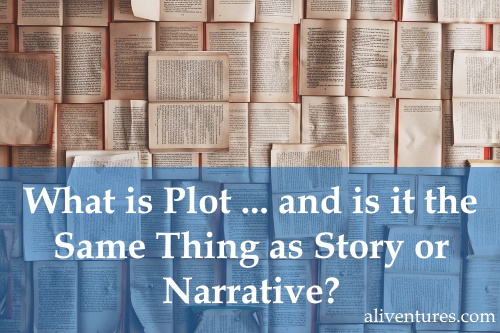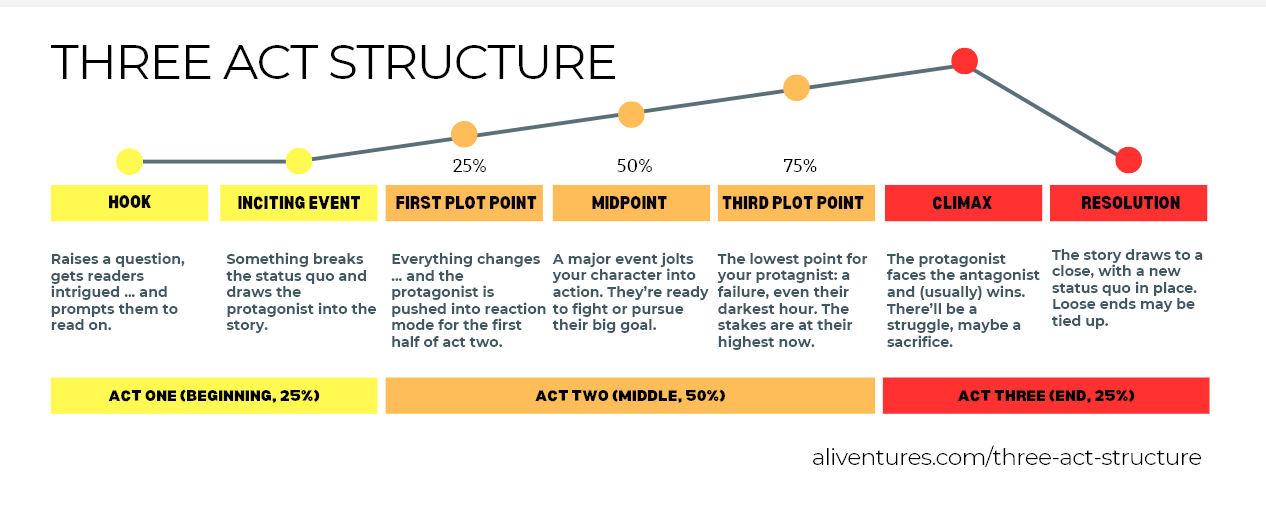What is Plot … and is it the Same Thing as Story or Narrative?

This post was first published in August 2019 and last updated in March 2025.
What exactly is plot? Is it just what we call “story” or “narrative” … or is it something else?
While many elements of storytelling – like dialogue – are easy to point to, plot can be trickier to pin down.
Here are a few definitions of plot:
A plot is a sequence of events in which every cause has an effect, pulling the story towards its conclusion.
(from What is Plot?, Ruthanne Reid, The Write Practice)
Plot is the chain of connected events that make up a narrative. It refers to what actually occurs in a story and is one of storytelling’s major pillars. Some will say that if characters are the who and theme is the why, then the plot is the what of the story.
(from What is Plot? An Author’s Guide to Storytelling, Reesy)
The plot of a film, novel, or play is the connected series of events which make up the story.
(from “Plot”, Collins Dictionary)
Does Your Plot Structure Need to be Complicated?
I’m a more character-driven than plot-driven writer, so I have to fight against my tendency to worry that “good” plots are supposed to be complicated, convoluted, and tricky to work out.
Plots needn’t be super-detailed and intricate in order to work well.
Often, a “good” plot simply means putting things in place that will come together further down the line – particularly elements that can be brought together in an unexpected (but very plausible) way.
For instance, a mistake that your protagonist makes midway through your story might seem not to have any ramifications immediately … but combined with a crucial piece of information that you slipped in during the first few chapters, it could prove really dangerous at the climax of the story.
In structural terms, novels will generally go through these key plot points (hat-tip to K.M. Weiland for all her writing on story structure!)

Hook: The hook comes within the first few pages and might even be the opening line. (E.g. the first line of 1984: “It was a bright cold day in April, and the clocks were striking thirteen.”)
Inciting Event: Also called the “inciting incident”, this kicks off the rising action. The protagonist’s world changes in some major way. (E.g. Harry learns he’s a wizard in Harry Potter and the Philosopher’s Stone.)
First Plot Point: This starts Act Two of your story, with a major change that forces the protagonist into reaction mode. (E.g. Haymitch begins coaching Katniss and Peeta in The Hunger Games.)
Midpoint: Also known as the “second plot point”, this jolts your protagonist out of “react” mode and into decisive action. (E.g. Darcy proposes to Elizabeth in Pride and Prejudice … and she turns him down.)
Third Plot Point: Your protagonist is at an all-time low and it may look like there’s no way out. (E.g. Aslan is killed on the stone table in The Lion, The Witch, and The Wardrobe.)
Climax: The climax is the point where the protagonist and antagonist face off … and one of them is the victor (usually, but not always, the protagonist). (E.g. Dorothy defeats the witch by pouring a bucket of water over her in The Wizard of Oz.)
Resolution: There’s a period of falling action between the climax and resolution, also known as the denouement, of the story. (E.g. In Othello, the truth comes out that Iago has deceived Othello … Desdemonoa was innocent).
If you do feel your plot needs to be more complex, that’s fine … but don’t add complications for the sake of it.
Should You Figure Out Your Whole Plot in Advance?
Some writers (“plotters”) like to plan and outline a lot before they start writing.
Others (called “pantsers” from “seat-of-the-pants writing”) may have a rough idea about characters, themes, and key moments along the way – but they don’t do much actual plotting before they launch in.
You don’t have to work out all the details of your plot before you start writing. During the first draft, or after it’s complete, you might go back and work things in to add intricacy to the plot. Ultimately, so long as you’re willing to revise and rework your story, it’s fine to begin writing without having a full plot worked out.
Are There Really Only 6/7/20/36 Plots?
There are a lot of books and articles out there suggesting that there are a set number of “basic” or “archetypal” plots. Here are a few of them:
- Every story in this world has one of these six basic plots (article based on research from Washington State University and the University of Vermont)
- The Seven Basic Plots: Why We Tell Stories (book by Christopher Booker, with plots like “voyage and return” and “overcoming the monster”)
- 20 Master Plots: And How to Build Them (book by Ronald B. Tobias)
- 36 Dramatic Situations (Wikipedia’s summary of Georges Polti’s Les trente-six situations dramatiques, published in 1896)
No story can be truly unique when you take a very “zoomed out” view. The basic building blocks (like “boy meets girl”) are going to be there in stories from centuries ago, as well as in the stories yet to be written.
Beyond these very broad strokes, though, your plot will be your own. The events you choose, the way you shape them and put them together, and the narrative choices you make will all be unique.
What’s the Difference Between Story and Plot?
Let us define plot. We have defined a story as a narrative of events arranged in their time-sequence. A plot is also a narrative of events, the emphasis falling on causality. ‘The king died and then the queen died,’ is a story. ‘The king died, and then the queen died of grief,’ is a plot. The time-sequence is preserved, but the sense of causality overshadows it. Or again: ‘The queen died, no one knew why, until it was discovered that it was through grief at the death of the king.’ This is a plot with a mystery in it…
– E.M. Forster, in Aspects of the Novel
While we often talk about novels as “stories” (and we read “short stories” not “short plots”), as an author, you’re not just telling a story.
As E.M. Forster explains in that classic quote above, story tells you what happened, and what happened next.
Plot, however, involves a cause-and-effect relationship.
In your novel or short story, events affect one another. Your protagonist’s actions and words have consequences, for good or for bad.
Sometimes this effect might be immediate (your protagonist stands up to a bad guy and gets beaten up as a result); sometimes the wheels are set in motion a long time before (fifteen years ago, your protagonist had a youthful fling that – much to his surprise – leads to him discovering that he’s now the parent of a teenager).
What’s the Difference Between Plot and Narrative?
Narrative is how the story is told.
You could keep the events of your plot exactly the same but rewrite your novel as a book that reads very differently purely because of narrative choices.
There’s definitely an overlap between what we call “plot” and what we call “narrative”, especially if your story involves cutting between different times, using flashbacks, telling things out of chronological sequence, and so on.
But narrative also encompasses things like the “voice” of the story – plot is generally concerned purely with the events.
When you’re plotting a story, you don’t necessarily need to decide (for instance) whether you’re going to write it in the first person or third person, or in the present or past tense. Those decisions are narrative choices.
Another way to look at this is that plot is objective and narrative is subjective.
Ultimately … it doesn’t matter too much whether you use the word “plot”, or something like “structure”, “outline”, or “story” to describe the events of your novel or short story. What matters is that you’re conscious about your plotting (whether that means doing it up-front or after the first draft), and that your plot is interesting and engaging for your readers.
For more help with plotting, take a look at:
About

I’m Ali Luke, and I live in Leeds in the UK with my husband and two children.
Aliventures is where I help you master the art, craft and business of writing.
Start Here
If you're new, welcome! These posts are good ones to start with:
Can You Call Yourself a “Writer” if You’re Not Currently Writing?
The Three Stages of Editing (and Nine Handy Do-it-Yourself Tips)
My Novels

My contemporary fantasy trilogy is available from Amazon. The books follow on from one another, so read Lycopolis first.
You can buy them all from Amazon, or read them FREE in Kindle Unlimited.

This is so informative, Ali. Thank you. I never really thought about the differences between narrative, story and plot before. A good beginning for this series.
thank u for informations
u are the best